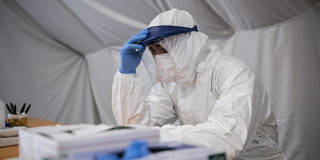Our existing ethical frameworks for health-care decisions were not devised for a pandemic – and it shows. The principles that have been enshrined, while important, do not address the difficult question of what to do when medical resources are suddenly in short supply, as they are now.
BUDAPEST – Since the SARS-CoV-2 virus spread from China to most of the world in February and March, we have all gradually become participants in textbook ethical dilemmas. Above all, the COVID-19 pandemic has presented overloaded health systems with the huge question of how to continue caring for patients in a secure, fair, and effective way. And, worryingly, the crisis has highlighted not only the unpreparedness of politicians and health-care systems, but also our failure to develop relevant ethical norms.

BUDAPEST – Since the SARS-CoV-2 virus spread from China to most of the world in February and March, we have all gradually become participants in textbook ethical dilemmas. Above all, the COVID-19 pandemic has presented overloaded health systems with the huge question of how to continue caring for patients in a secure, fair, and effective way. And, worryingly, the crisis has highlighted not only the unpreparedness of politicians and health-care systems, but also our failure to develop relevant ethical norms.